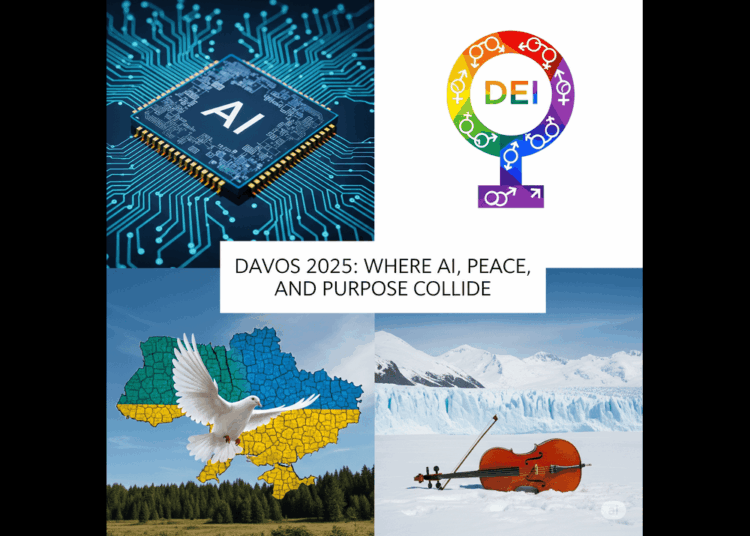The World Economic Forum at Davos 2025 delivered a dramatic blend of diplomacy, economic strategy, and technology discourse. This year’s summit featured compelling developments in AI deployment, diversity and inclusion, geopolitical peace efforts, and energy transition, all underpinned by growing demands for policy agility and collaboration. Here’s a breakdown of the key takeaways.
AI Deployment and Global Tech Competition
AI deployment
Two years after generative AI captured global imagination, the spotlight shifted to practical use: AI agents designed to automate repetitive enterprise tasks. Industry voices at Davos, including Lightspeed Venture’s Guru Chahal, predicted 2025 as a pivotal year for AI deployment across enterprises.
Yet alongside this enthusiasm came urgency. U.S. executives expressed concern that America’s AI edge over China could fade without robust infrastructure investment and supportive policy. Jared Cohen of Goldman Sachs emphasized, “The question is whether the U.S. can do the infrastructure build-out alone.”
DEI Under Fire Amid Corporate Tensions
DEI
Trump’s controversial stance on diversity, equity, and inclusion (DEI) sparked debate in Davos. As federal DEI programs face rollbacks under his administration, business leaders at the Forum found themselves defending inclusive practices. Gender parity, minority representation, and workplace equity remain core WEF goals—causing concern over political interference in corporate DEI initiatives.
This tension prompted firms to reassess language and strategies to maintain inclusive work environments amid mounting regulatory pressure.
Global Diplomacy: A Push for Peace
global peace
Diplomatic overtures stole headlines. Trump called for direct talks with Russian President Putin, aiming to resolve the war in Ukraine. Meanwhile, Ukrainian President Volodymyr Zelenskiy insisted on a 200,000-strong European peacekeeping force as a precondition—something Russia refused.
In the Middle East, momentum grew with ceasefires between Israel, Hamas, and Hezbollah. Trump was credited with potentially being the only leader capable of nudging Israeli Prime Minister Netanyahu toward a Palestinian state.
Iran also chose Davos as a stage to announce its willingness to renegotiate the nuclear deal and pledged it posed no threat to its neighbors. “Now it’s time to move forward based on opportunity, not threats,” said Vice-President Javad Zarif.
Energy Transition and Economic Stability
energy transition
Saudi Arabia’s Economy Minister Faisal al-Ibrahim underscored the need for intrepid leadership on energy transition, pledging stable supply to meet rising AI-related energy demand. The Kingdom also announced it will host a regular World Economic Forum meeting beginning in 2026.
Meanwhile, BlackRock CEO Larry Fink and ECB President Christine Lagarde discussed Europe’s slow regulatory pace and innovation gap. Fink called the EU a “beautiful myth” lacking unity in banking and capital markets, while Lagarde stressed Europe’s untapped potential if reforms are implemented.
Trade Policy and Tariff Talk: Risks and Realities
global trade policy
Trump’s call for the EU to deregulate faster to match U.S. competitiveness echoed among corporate leaders. While praising U.S. deregulation, they warned that EU rhetoric must evolve into swift action. IMF’s Kristalina Georgieva added that open trade with “friends of all” delivers better results than political bloc alignment.
Notably, no Davos participant supported tariffs, underlining consensus that they inflate costs without long-term economic benefit.
A Moment for the Planet: Climate and Culture
Amid closed-door power talks, cellist Yo-Yo Ma performed outdoors in a tribute to glaciers and the climate crisis. Hosted by Arctic Basecamp, the performance reminded attendees of what’s at stake beyond economic and political interests.
“I was asked to perform for the glaciers and mountains,” said Ma, before playing Bach and “Over the Rainbow” in the snow, bringing a moment of calm reflection to the summit.
Looking Ahead: Europe’s Wake-Up Call
As global leaders warned of geopolitical fragmentation, ECB’s Lagarde struck an optimistic tone. Europe has the talent, resources, and stability to lead—if it can act cohesively. With support from top institutions and growing calls to unlock investment, there’s cautious hope that transformation is possible.
For more in-depth analysis on global business trends, AI, and sustainability leadership, read IMPAAKT, the top business magazine shaping the future of impact reporting.











